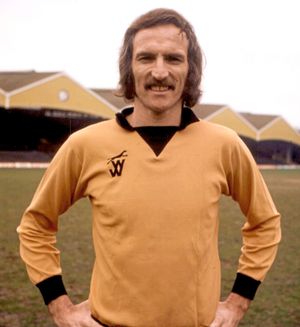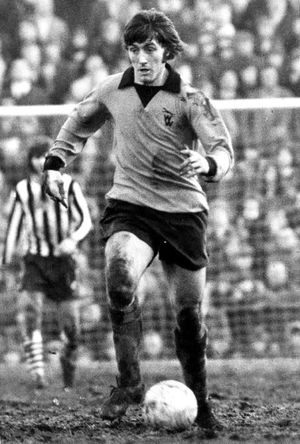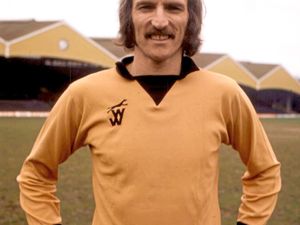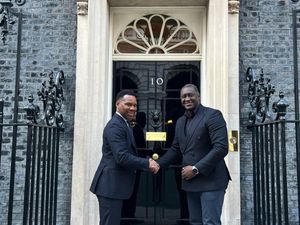When Steve Kindon delivered a Cup KO!
The atmosphere, and anticipation, was building.
Kick-off in a crucial FA Cup quarter final and passionate Midlands’ derby in front of a crowd of over 50,000 was barely minutes away.
Players were going through their customary warm-ups, loosening the limbs, straining the sinews.
And then, all of a sudden, one of the stars of the show, the talismanic experienced striker, crashed to the ground.
He had been struck in the head by a ball sent powerfully over from the left wing by the substitute.
Welcome to the weird, wild and not so wonderful prelude to the last FA Cup quarter-final between Wolves and Coventry, which took place this very weekend, back in 1973.
“This is how it was,” begins Steve Kindon, the unintentional protagonist behind the whole incident whose skills as a pacey and powerful forward are matched by that as a skilled and extremely humorous raconteur.
“When we used to warm up, I’d be on the left wing near the tunnel sending in crosses for Lofty (goalkeeper Phil Parkes) and John Richards would be in and around the penalty spot.
“Lofty would put his hand up in the air if he wanted me to lob in a cross, or hold it out if he wanted me to drive one with more power.
“I’d cross one in, Phil would catch it, and then John would fire two or three into Phil’s chest, then I’d cross one in again.
“Before that Coventry match, our striker Derek Dougan was doing his own pre-match routine and, once he was warm enough, started to walk towards the North Bank to conduct the Wolves fans who were singing his name.
“Phil put his hand out, requesting a driven ball, so that’s what I did, I drove the ball towards his chest. And then, about three yards before it reached him, the Doog was walking the other way, not looking in my direction, and the ball smacked him on the side of his head.

“As I used to say many times while doing my after dinner speaking, for once in my life I had actually hit the ball accurately.”
With Dougan lying crumpled on the floor, all hell broke loose. Sammy Chung, later a promotion-winning Wolves manager but at this time assistant to Bill McGarry, sprinted on from the dugout, smelling salts at the ready.
Kindon and hos concerned Wolves team-mates crowded around.
“We had some great back-up players at that time, including Kindo, our substitute that day,” recalls Richards, who had got to know Kindon as a fellow sports-mad Lancashire schoolboy born in Warrington. “He was exciting, and always a threat who could ignite a game when coming off the bench.
“On that day he created some excitement even before the game had kicked off, knocking out Derek with a beautifully drilled cross intended for Lofty. After the ball smacked him on the side of the head, he was unconscious!”
No-nonsense boss McGarry had been taking his seat up in the stand as the drama ensued, so took a little longer to arrive at the scene of the crime. The extra distance, however, hadn’t tempered his anger.
“He wasn’t best pleased,” describes Kindon, with a slight touch of understatement. “Sammy had told me not to worry and that it was an accident but Bill McGarry went berserk at me – ‘Kindon, what the hell are you doing? – or words to that effect.”
Fortunately, the smelling salts did the trick, and Dougan came around, the game kicking off after a five-minute delay.
And then, seven minutes later, Dougan won a towering header which helped play in Richards for a fantastic opening goal to put Wolves in front.
The Doog’s recovery was complete, though not as complete as the run and finish from Richards, out-muscling Coventry defender Bobby Parker before running on and dispatching a clinical finish past Bill Glazier.
“John went off like a bullet to get us that early goal,” recalls midfielder Kenny Hibbitt, who was then himself under the spotlight shortly after half-time when Richards was bundled over in the area and Wolves were awarded a penalty.
“That was when my nerves started to take over,” Hibbitt continues. “I knew how important the penalty would be to get 2-0 in front as there would be no way back for them, but also negative thoughts came into my mind about perhaps missing it.
“I always tried to put my penalties in the same place, apart from once against Birmingham when my brother (Terry) was there so I thought he would have told them and I changed my mind.
“That one ended up in Row H of the South Bank and probably knocked a policeman’s helmet off – I shouldn’t have changed my mind.
“I always felt that if you hit a penalty into the corner with enough pace a goalkeeper would always struggle to get there. Thankfully I put it away against Coventry and the tension was eased.”
And there had been tension, because the Sky Blues, also in the top division, had very much been in the tie. Their chief threat had come from a certain midfielder by the name of Willie Carr, who would join Wolves a couple of years later, and be part of the team which won the League Cup final in 1980.
As for Kindon, he was actually called upon by McGarry not long after Richards had opened the scoring, when Jim McCalliog pulled up with a leg injury.
It was that role, coming off the bench to make an impact, which Kindon chiefly had to fill under McGarry’s stewardship, despite having been Wolves’ record signing when joining from Burnley for £100,000.
“I think he saw me as a really effective super-sub, a bit like David Fairclough at Liverpool, and so many of my appearances under McGarry came from the bench,” Kindon reflects.
Being an effective sub probably didn’t include knocking out one of the team’s key figures during the warm-up, but, ultimately, there were no lasting after-effects for player and team as Wolves made it through to the semi-finals with the 2-0 win in front of a Molineux crowd of 50,106 which hasn’t been surpassed since.
Taking into consideration reaching the UEFA Cup Final in 1972, winning the Texaco Cup a year earlier and then the League Cup in both 1974 and 1980, across an 11-year period Wolves reached no fewer than eight semi-finals.
“At the time, we were a very good cup team, and for some reason the knockout competitions brought out the best in us,” says Richards.
“We had a great team, capable of beating anyone on the day, and especially at Molineux, and the fans were always up for a cup run.
“We had some great lads with a good mix of players – top quality seasoned professionals like Mike Bailey, the Doog and Waggy, supported by younger top-class talent such as Lofty, Frank Munro, Derek Parkin, John McAlle and Kenny.
“When everybody was fit, we feared nobody.”

Sadly, so many of the epic cup runs ended at the semi-final stage, including this particular year, after the Coventry win, when a tale of missed chances saw Wolves fall to Billy Bremner’s second-half goal against a strong Leeds side at Maine Road.
“We lost 1-0 in a very tight game which was a massive disappointment because, in hindsight, we probably should have won,” Richards continues.
“That was another tough one for us to take,” echoes Hibbitt, who enjoyed a couple of seasons with Coventry at the end of his career but left the year before they won the cup in 1987.
“Just as it was losing to Arsenal at Villa Park, and then Spurs at Hillsborough when we should have won in extra-time but then had to play them at Highbury in the replay.
“We had lots of opportunities to get to cup finals, and there have been a couple of semi-finals for Wolves since, including under Nuno a few years ago when it was so close.”
Wolves went on to finish fifth in the top-flight in that 1972/73 season, as well as making it a double of semi-final defeats having been beaten by Spurs in the last four of the League Cup three months prior to the loss against Leeds.
For Richards, it was one of his best ever seasons in a Wolves shirt. He finished on 27 league goals, just one behind overall top scorer Pop Robson, added a further nine in the different cup competitions and achieved his solitary senior England cap – of course it should have been more – against Northern Ireland at the campaign’s conclusion.
“Personally, it was a successful season but the goals came thanks to the team’s performances,” he reflects. “It was an honour to receive that England call-up for the end-of-season home internationals and a European tour, and to pick up one cap and a couple of selections on the bench.
“Looking back, it was maybe disappointing not to receive more, but at the time I was just delighted to be included and to be part of a squad including the likes of Bobby Moore, Martin Peters and Alan Ball.”
To bring it back to the present, both Richards and Hibbitt, the latter who will be at Molineux with fellow Wolves and Sky Blues alumni Carr and Barry Powell for this Saturday’s lunchtime showdown, have confidence that the men in gold and black have the potential to go all the way this season.
“I’d love to see Wolves get back to Wembley, particularly for a final, so the younger generation can have that feeling that we had back in the 70s and 1980,” says Hibbitt.
“Probably unlike now, the cup competitions were as important as the league when we played,” adds Richards. “Every player wanted to get to a cup final, particularly at Wembley – it was every young footballer’s dream and every football supporter’s dream too. Eventually we managed to achieve our dream – and you can’t do any better than that!
“Looking ahead to this weekend, I have a similar feeling to the one I had prior to the game in ’73.
“The current Wolves team is capable of beating any other on its day, as ever, the Wolves supporters will play a key role. So, it’s a déjà vu moment, I’m predicting a 2-0 win for Wolves – and on to Wembley!”
For Kindon meanwhile, the mere mention of the fixture brings back all the memories of that bizarre pre-match moment, the legacy of which lingered on for some considerable time.
“It was a good six months later that a letter was sent to the club from some students at the University of Wolverhampton,” he recalls.
“It was a survey, asking lots of questions about me and football, multiple choice so would I rather do (a), (b), (c) or (d) etc. With every single question, the fourth option was ‘or would you rather knock Derek Dougan out with a shot before a big FA Cup game?’.
“It raised a chuckle in the dressing room that’s for sure – it’s a moment I’ve never quite been able to live down.”





